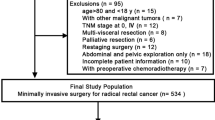Abstract
Background
Robotic technology has been proven to be a safe alternative to conventional laparoscopy with regards to the peri- and postoperative clinical outcomes. Oncological outcomes have been scarcely examined. The purpose of this study was to examine the disease-free survival in relation to the two surgical approaches: robot-assisted surgery and conventional laparoscopy. In addition, all-cause mortality and recurrence-free survival were investigated.
Methods
Between January 2010 and December 2015, patients, undergoing either laparoscopic or robot-assisted elective, curative-intended surgery for colorectal cancer were included.
Results
A total of 9184 patients underwent surgery in the study period: 5978 patients for colon cancer and 3206 patients for rectal cancer. Among patients with colon cancer, 331 patients (5.5%) underwent robot-assisted surgery, and 449 patients (14.0%) underwent robot-assisted surgery in the rectal cancer group. In the adjusted analyses, the hazard ratio (HR) for disease-free survival, for patients with colon cancer was 0.91 [95% confidence interval (CI) 0.71–1.18]. For patients with rectal cancer, the adjusted HR was 0.83 (95% CI 0.65–1.06). No difference in all-cause mortality and recurrence-free survival were observed.
Conclusions
The study demonstrated comparable rates of disease-free survival, all-cause mortality, and recurrence-free survival when comparing robot-assisted surgery with conventional laparoscopy in patients with colorectal cancer.
Similar content being viewed by others
References
Rawlings AL, Woodland JH, Crawford DL. Telerobotic surgery for right and sigmoid colectomies: 30 consecutive cases. Surg Endosc. 2006;20:1713–8.
Stylopoulos N, Rattner D. Robotics and ergonomics. Surg Clin North Am. 2003;83:1321–37.
Cadiere GB, Himpens J, Germay O, et al. Feasibility of robotic laparoscopic surgery: 146 cases. World J Surg. 2001;25:1467–77.
Trastulli S, Cirocchi R, Desiderio J, et al. Robotic versus laparoscopic approach in colonic resections for cancer and benign diseases: systematic review and meta-analysis. PLoS One. 2015;10:e0134062.
Tyler JA, Fox JP, Desai MM, Perry WB, Glasgow SC. Outcomes and costs associated with robotic colectomy in the minimally invasive era. Dis Colon Rectum. 2013;56:458–66.
Yang Y, Wang F, Zhang P, et al. Robot-assisted versus conventional laparoscopic surgery for colorectal disease, focusing on rectal cancer: a meta-analysis. Ann Surg Oncol. 2012;19:3727–36.
deSouza AL, Prasad LM, Park JJ, Marecik SJ, Blumetti J, Abcarian H. Robotic assistance in right hemicolectomy: is there a role? Dis Colon Rectum. 2010;53:1000–6.
Park JS, Choi GS, Park SY, Kim HJ, Ryuk JP. Randomized clinical trial of robot-assisted versus standard laparoscopic right colectomy. Br J Surg. 2012;99:1219–26.
Kim J, Baek SJ, Kang DW, et al. Robotic resection is a good prognostic factor in rectal cancer compared with laparoscopic resection: long-term survival analysis using propensity score matching. Dis Colon Rectum. 2017;60:266–73.
Lim DR, Bae SU, Hur H, et al. Long-term oncological outcomes of robotic versus laparoscopic total mesorectal excision of mid-low rectal cancer following neoadjuvant chemoradiation therapy. Surg Endosc. 2017;31:1728–37.
Wilder FG, Burnett A, Oliver J, Demyen MF, Chokshi RJ. A review of the long-term oncologic outcomes of robotic surgery versus laparoscopic surgery for colorectal cancer. Indian J Surg. 2016;78:214–9.
Cho MS, Baek SJ, Hur H, et al. Short and long-term outcomes of robotic versus laparoscopic total mesorectal excision for rectal cancer: a case-matched retrospective study. Medicine (Baltimore). 2015;94:e522.
Park EJ, Cho MS, Baek SJ, et al. Long-term oncologic outcomes of robotic low anterior resection for rectal cancer: a comparative study with laparoscopic surgery. Ann Surg. 2015;261:129–37.
Danish Colorectal Cancer Group yearly report (2014). https://dccg.dk/wp-content/uploads/2017/10/Aarsrapport_2014.pdf. Accessed 1 May 2018.
Thygesen LC, Daasnes C, Thaulow I, Bronnum-Hansen H. Introduction to Danish (nationwide) registers on health and social issues: structure, access, legislation, and archiving. Scand J Public Health. 2011;39:12–6.
Pedersen CB, Gotzsche H, Moller JO, Mortensen PB. The Danish Civil Registration System. A cohort of eight million persons. Dan Med Bull. 2006;53:441–9.
Lynge E, Sandegaard JL, Rebolj M. The Danish National Patient Register. Scand J Public Health. 2011;39:30–3.
Lash TL, Riis AH, Ostenfeld EB, Erichsen R, Vyberg M, Thorlacius-Ussing O. A validated algorithm to ascertain colorectal cancer recurrence using registry resources in Denmark. Int J Cancer. 2015;136:2210–5.
Vandenbroucke JP, von Elm E, Altman DG, et al. Strengthening the reporting of observational studies in epidemiology (STROBE): explanation and elaboration. Ann Intern Med. 2007;147:W163–94.
Lim DR, Min BS, Kim MS, et al. Robotic versus laparoscopic anterior resection of sigmoid colon cancer: comparative study of long-term oncologic outcomes. Surg Endosc. 2013;27:1379–85.
Quirke P, Steele R, Monson J, et al. Effect of the plane of surgery achieved on local recurrence in patients with operable rectal cancer: a prospective study using data from the MRC CR07 and NCIC-CTG CO16 randomised clinical trial. Lancet. 2009;373:821–8.
Jayne D, Pigazzi A, Marshall H, et al. Effect of robotic-assisted vs conventional laparoscopic surgery on risk of conversion to open laparotomy among patients undergoing resection for rectal cancer: the ROLARR randomized clinical trial. JAMA. 2017;318:1569–80.
Fransgaard T, Pinar I, Thygesen LC, Gögenur I. Association between robot-assisted surgery and resection quality in patients with colorectal cancer. Surg Oncol. 2018;27:177–84.
Tam MS, Kaoutzanis C, Mullard AJ, et al. A population-based study comparing laparoscopic and robotic outcomes in colorectal surgery. Surg Endosc. 2016;30:455–63.
Acknowledgment
The work was supported by an unlimited grant from Intuitive Surgical Inc. The company had no influence on the design or conduct of the study, collection, management, analysis or interpretation of the data or preparation, review, or approval of the manuscript. I. Gögenur received an unrestricted research grant from Intuitive and travel grant for advisory board meeting.
Author information
Authors and Affiliations
Corresponding author
Rights and permissions
About this article
Cite this article
Pinar, I., Fransgaard, T., Thygesen, L.C. et al. Long-Term Outcomes of Robot-Assisted Surgery in Patients with Colorectal Cancer. Ann Surg Oncol 25, 3906–3912 (2018). https://doi.org/10.1245/s10434-018-6862-2
Received:
Published:
Issue Date:
DOI: https://doi.org/10.1245/s10434-018-6862-2




